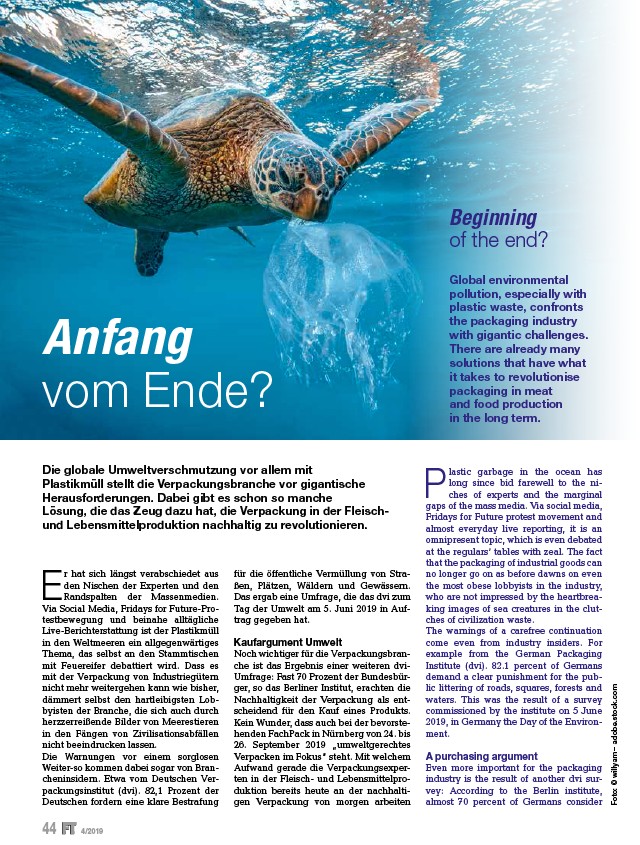
Foto: © willyam – adobe.stock.com
Anfang
vom Ende?
Die globale Umweltverschmutzung vor allem mit
Plastikmüll stellt die Verpackungsbranche vor gigantische
Herausforderungen. Dabei gibt es schon so manche
Lösung, die das Zeug dazu hat, die Verpackung in der Fleisch-
und Lebensmittelproduktion nachhaltig zu revolutionieren.
Er hat sich längst verabschiedet aus
den Nischen der Experten und den
Randspalten der Massenmedien.
Via Social Media, Fridays for Future-Pro-testbewegung
und beinahe alltägliche
Live-Berichterstattung ist der Plastikmüll
in den Weltmeeren ein allgegenwärtiges
Thema, das selbst an den Stammtischen
mit Feuereifer debattiert wird. Dass es
mit der Verpackung von Industriegütern
nicht mehr weitergehen kann wie bisher,
dämmert selbst den hartleibigsten Lob-byisten
der Branche, die sich auch durch
herzzerreißende Bilder von Meerestieren
in den Fängen von Zivilisationsabfällen
nicht beeindrucken lassen.
Die Warnungen vor einem sorglosen
Weiter-so kommen dabei sogar von Bran-cheninsidern.
Etwa vom Deutschen Ver-packungsinstitut
(dvi). 82,1 Prozent der
Deutschen fordern eine klare Bestrafung
für die öffentliche Vermüllung von Stra-ßen,
Plätzen, Wäldern und Gewässern.
Das ergab eine Umfrage, die das dvi zum
Tag der Umwelt am 5. Juni 2019 in Auf-trag
gegeben hat.
Kaufargument Umwelt
Noch wichtiger für die Verpackungsbran-che
ist das Ergebnis einer weiteren dvi-
Umfrage: Fast 70 Prozent der Bundesbür-ger,
so das Berliner Institut, erachten die
Nachhaltigkeit der Verpackung als ent-scheidend
für den Kauf eines Produkts.
Kein Wunder, dass auch bei der bevorste-henden
FachPack in Nürnberg von 24. bis
26. September 2019 „umweltgerechtes
Verpacken im Fokus“ steht. Mit welchem
Aufwand gerade die Verpackungsexper-ten
in der Fleisch- und Lebensmittelpro-duktion
bereits heute an der nachhalti-gen
Verpackung von morgen arbeiten
Beginning
of the end?
Global environmental
pollution, especially with
plastic waste, confronts
the packaging industry
with gigantic challenges.
There are already many
solutions that have what
it takes to revolutionise
packaging in meat
and food production
in the long term.
Plastic garbage in the ocean has
long since bid farewell to the ni-ches
of experts and the marginal
gaps of the mass media. Via social media,
Fridays for Future protest movement and
almost everyday live reporting, it is an
omnipresent topic, which is even debated
at the regulars‘ tables with zeal. The fact
that the packaging of industrial goods can
no longer go on as before dawns on even
the most obese lobbyists in the industry,
who are not impressed by the heartbrea-
king images of sea creatures in the clut-ches
of civilization waste.
The warnings of a carefree continuation
come even from industry insiders. For
example from the German Packaging
Institute (dvi). 82.1 percent of Germans
demand a clear punishment for the pub-lic
littering of roads, squares, forests and
waters. This was the result of a survey
commissioned by the institute on 5 June
2019, in Germany the Day of the Environ-ment.
A purchasing argument
Even more important for the packaging
industry is the result of another dvi sur-vey:
According to the Berlin institute,
almost 70 percent of Germans consider
44 4/2019